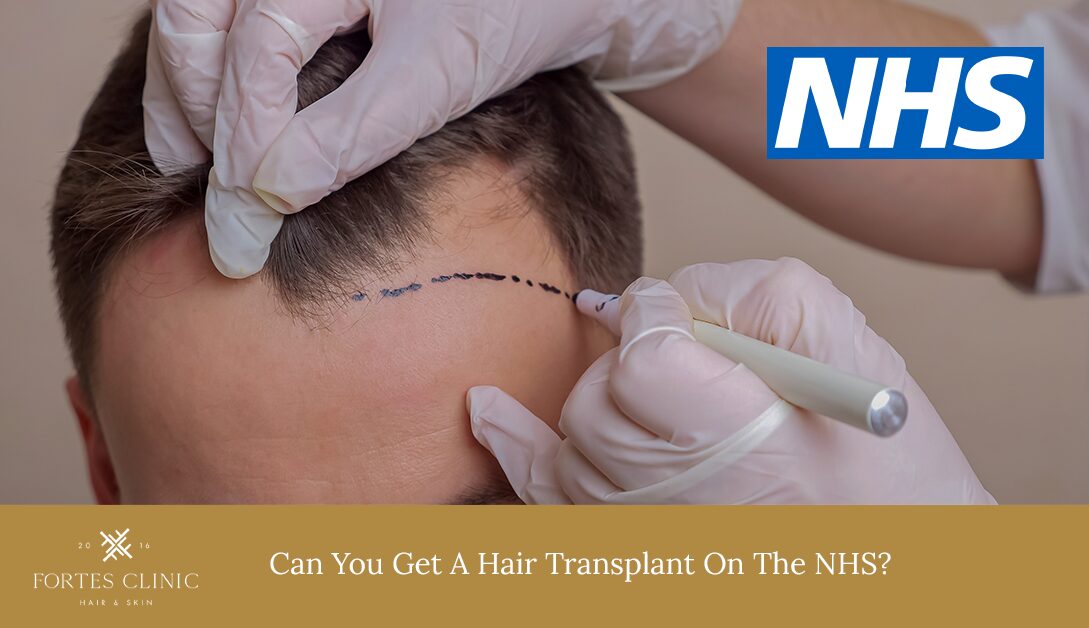Can You Get A Hair Transplant On The NHS: An Introduction
In the United Kingdom, hair loss is a prevalent concern, impacting millions across various age groups. Many consider hair loss a natural part of aging, but for others, it brings significant psychological distress. Advances in medical procedures have made hair transplants a viable option for many, leading to a pivotal question: can you get a hair transplant on the NHS?
Understanding Hair Transplants
What is a Hair Transplant?
A hair transplant is a surgical technique designed to combat baldness. It involves the removal of hair follicles from a part of the head with ample hair (known as the ‘donor site’) and implanting them where hair is thinning or absent (the ‘recipient site’). The two primary types of hair transplants are Follicular Unit Transplantation (FUT) and Follicular Unit Extraction (FUE). FUT involves removing a strip of scalp and extracting individual follicular units, while FUE requires extracting individual hair follicles directly from the scalp.
The Need for Hair Transplants
Hair loss can be attributed to various factors, including genetics, hormonal changes, medical conditions, and lifestyle. Beyond the physical aspect, hair loss can lead to diminished self-confidence and social anxiety. This psychological impact makes hair transplant procedures not just a cosmetic choice but also a therapeutic one for many.
The NHS and Hair Transplants
NHS Overview
The NHS, established post-World War II, is a publicly funded healthcare system. It provides a wide range of health services, generally free at the point of use. The NHS covers treatments deemed necessary for the health and well-being of the patient, based on a set of criteria.
Can I Get A Hair Transplant On The NHS?
Hair transplant procedures are typically categorised as cosmetic surgeries. Consequently, they are not usually available on the NHS, with the organization prioritising treatments that are medically necessary. However, exceptions may occur, such as when hair loss is due to accidents, burns, or certain diseases. These cases are assessed individually, and the decision to fund a transplant is made based on specific medical criteria and the patient’s psychological needs.
Alternatives and Private Options
When the NHS Does Not Cover Hair Transplants
In scenarios where the NHS does not cover hair transplants, individuals often explore private healthcare options. It’s important to understand that the NHS’s decision is based on the principle of medical necessity versus cosmetic desire. Patients opting for private treatment should diligently research to find reputable clinics, understanding that the cost can be substantial.
Seeking Private Treatment
Private clinics offer more flexibility in terms of procedure options and scheduling. Costs in private facilities can vary greatly based on the extent of the procedure and the clinic’s location and reputation. Financing options are typically available, but it’s crucial for patients to be fully aware of the financial commitment involved.
Preparing for a Hair Transplant
Consultation and Evaluation
The first step towards a hair transplant is a detailed consultation with a specialist. This includes evaluating the patient’s scalp, discussing medical history, and understanding the patient’s expectations. This phase is crucial in determining whether the patient is a suitable candidate for a hair transplant.
Pre-Procedure Preparations
Once approved for the procedure, patients need to prepare both physically and mentally. This includes following the surgeon’s instructions on medication, diet, and lifestyle changes in the weeks leading up to the surgery. Pre-procedure preparations are crucial for minimizing risks and enhancing the likelihood of a successful transplant.
The Hair Transplant Procedure
The Process Explained
During the procedure, the surgeon administers local anaesthesia to the donor and recipient areas. In FUT, a strip of scalp is removed from the donor area, and individual follicular units are extracted from this strip. In FUE, each follicular unit is directly harvested from the scalp. The extracted follicles are then meticulously implanted into the recipient area. The process requires precision and can last several hours, depending on the transplant’s extent.
Risks and Considerations
Like all surgical procedures, hair transplants come with risks. These include infection, scarring, unnatural-looking new hair growth, and, occasionally, the rejection of transplanted hair follicles. An in-depth discussion with the surgeon about these risks and how there mitigation is an essential part of the pre-surgical process.
Aftercare and Follow-Up
Post-Transplant Care
After a hair transplant, the scalp may be tender, and patients may require pain medications for several days. Surgeons usually prescribe an antibiotic or anti-inflammatory drug to take for several days post-surgery. It’s critical to follow all post-operative instructions, including how to care for the scalp and when to return to normal activities.
Monitoring and Additional Treatments
Patients must attend follow-up appointments for the surgeon to monitor their recovery and the success of the transplant. Sometimes, additional treatment sessions may be necessary, particularly if hair loss continues or if the patient desires thicker hair coverage.
Why Fortes Clinic is Your Premier Choice for Hair Transplant
At Fortes Clinic, our commitment to excellence in hair restoration is without comparison. We combine top-tier medical expertise with a deeply personal approach to patient care. Our team of highly skilled surgeons, renowned for their proficiency in both FUT and FUE techniques, ensures that each treatment is of the highest standard.
We understand that hair loss is a unique journey for each individual, which is why we offer bespoke treatment plans tailored to meet your specific needs and goals.
Embracing the latest advancements in hair transplant technology, Fortes Clinic delivers effective treatments with minimal discomfort and a swift recovery process. Our thorough consultation process is a cornerstone of our approach. We ensure that you are well-informed and comfortable every step of the way. This commitment to patient care extends beyond the procedure itself, as we provide continuous support and comprehensive aftercare to ensure optimal results and a smooth recovery.
Speak to our team today to learn more.



